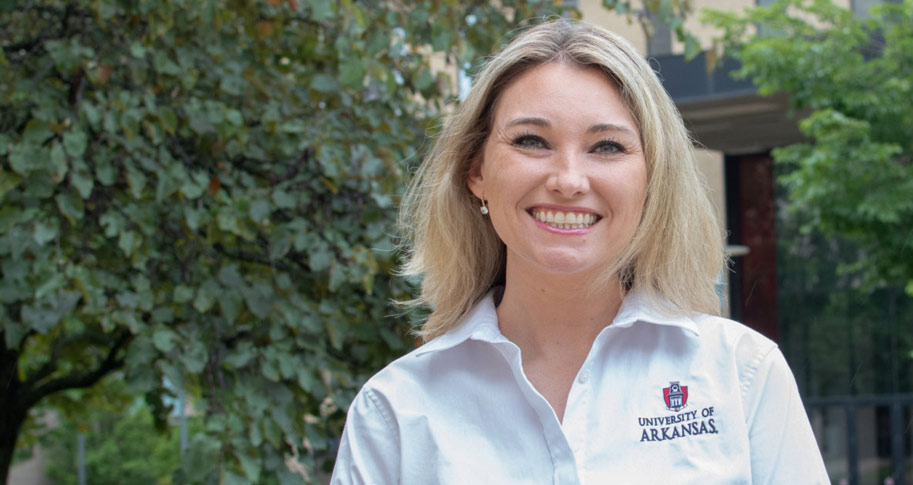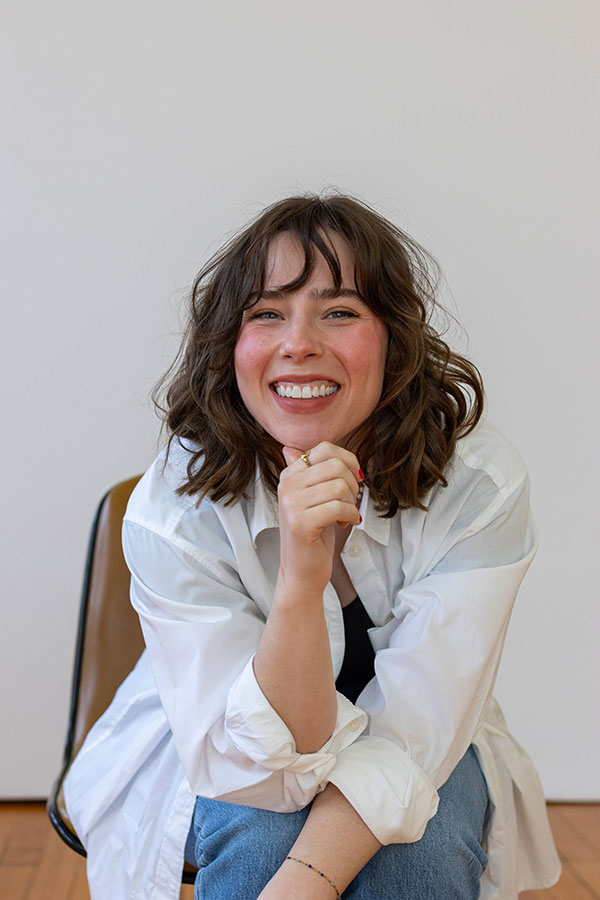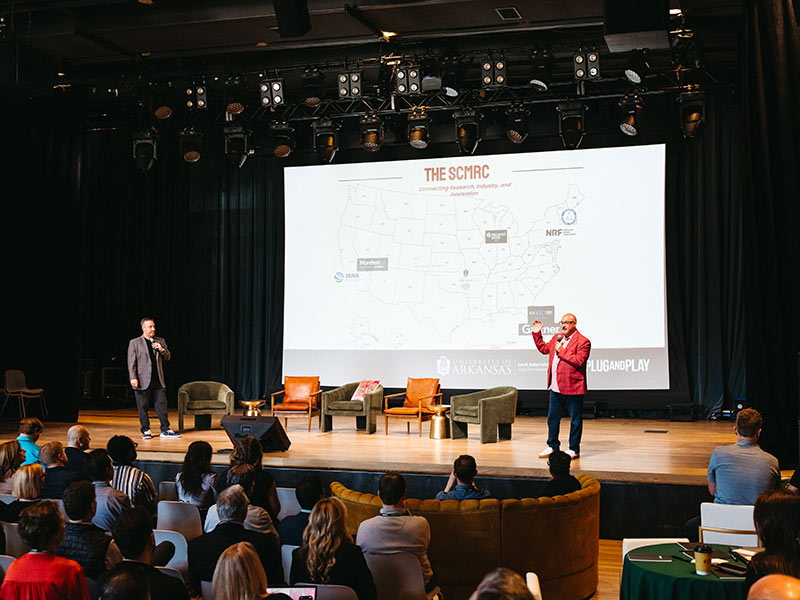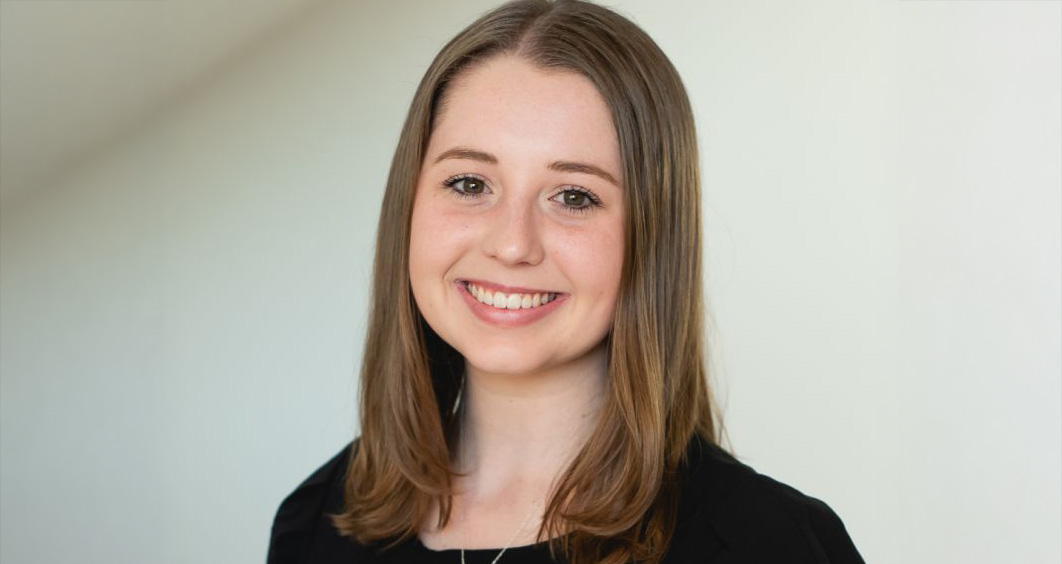
Amber Young is on a mission to put humanity back into informational technology. Currently an associate professor of information systems (ISYS) at the Sam M. Walton College of Business, her career has focused on showing students and the academic community how technology can bring about social good and empower people. Fresh out of undergrad with a degree in secondary mathematics education from the University of Oklahoma, Young helped establish a satellite campus for the Oklahoma School of Science Mathematics (OSSM).
OSSM is, according to their website, a school for high school “juniors and seniors with exceptional ability in science and mathematics.” It was there that Young realized her advanced calculus and physics students needed a more tangible way to understand her lessons. “I began using technology to help my students visualize sets of equations as 3D objects,” she explains when asked about the origins of her academic career, “I was amazed at how much easier calculus was for my students when they interacted with the software. I also really enjoyed developing and customizing applications for my students.”
Young stayed busy while working at OSSM, receiving her master’s degree in leadership and organizational development in 2011 from Oklahoma Christian University. “I completed my MBA so I could better understand the business aspects of running a school,” she shares. “I then pursued a doctorate in management information systems to learn how technology could be used for positive outcomes in a business setting.” With a PhD secured in 2015 from the University of Oklahoma, Young set off East and became an assistant professor of operations and information management at the University of Massachusetts Amherst. A few years later, a faculty member at the University of Arkansas told her about an opening at Walton College. Young wasn’t intending to move, but the idea of Walton never left her. After seeing how dedicated the faculty was to both research and students, the boxes were loaded into the van. Young officially joined Walton College as an assistant professor in 2018.
When asked how she feels technology will reshape human behavior in the future, Young shared that technology is already reshaping human interactions in major ways. “I think [technology] is already affecting human-human interactions. There are some really great things about technology. Information and communication technologies (ICTs) enable global and cross-cultural connections. This helps break down barriers and stereotypes. Story sharing online is making people empathetic and helping them relate to people with whom they may not have otherwise realized they have much in common,” she said.
Young points out that remote work is a massive benefit to come from the advancement of information technology, “Parents and caregivers can work remotely with the flexibility to manage their work schedules in a way that is healthy for their families.” However, Young also warns of the dangers of depersonalization and the erosion of accountability and civility that can accompany technological anonymity, "Users risk overlooking the humanity of other users and stripping others, or even themselves, of dignity."
She acknowledges, "It is most efficient to make decisions based on cold, hard numbers. However, leaders must be careful to remember the humanity of the people affected by decisions and not come to think of people as numbers on a spreadsheet.”
As artificial intelligence (AI) continues to blur the lines between what’s human and what’s a machine, Young stresses the importance of maintaining a clear distinction between people and objects. "I am concerned about what we might lose if we fail to distinguish between humans and objects," she notes. “Some people are quite harsh with digital assistants like Siri or Alexa for example. How does it affect a person’s soul and character to say harsh things to a human-like technology? On the other extreme, some people are coming to think of bots as friends or even partners. I believe it is important to remember what is unique and special about humans, so we do not equate people and objects.”
This distinction to preserve human dignity and prevent people from being viewed as mere numbers on a spreadsheet is woven into Young’s academic work. “I pursue research questions that excite me and feel important. I want to understand how technology can be designed and used for social and organizational good.” Additionally, she is working on quantitative studies to understand the impacts of gig work on dignity and work-life balance, the psychological effects of social media platforms and the risks of privacy violations from mobile apps, “Technology is a powerful tool, and we must make sure that power is applied in ways that promote human flourishing rather than dystopian outcomes.”
When asked about the most memorable aspects of her career, Young points to who started it all — her students. "The most memorable moments are when my students succeed,” she reflects. “It is wonderful to see former students get good jobs or get into grad school and come back to say thank you.”
As Young looks ahead, she plans to continue exploring the intersection of technology and social good, venturing into new areas with her Ph.D. candidates. “At this stage in my career, I am branching out a bit more,” she admits. “One of the case studies I am working on includes the development of Germany’s blockchain-enabled refugee asylum management system that facilitates every step of the asylum procedure from application to approval and repatriation.”
Young’s influential research has been published in esteemed academic journals, including MIS Quarterly, Journal of Management Information Systems and Journal of the AIS.
With such an extensive career, it’s natural to ask what’s up next for Young. “I have focused primarily on how technologies can be used for social good since 2011. I am excited about a paper I am working on that will summarize years of work on this topic and lay out a vision for how future research can build upon what we already know,” she shares.
Amber Young's dedication to her students, groundbreaking research and steadfast commitment to leveraging technology for impactful change make her an invaluable addition to the Walton College. Her work serves as an enduring source of inspiration and provides a clear path for shaping the future of information systems in a profoundly positive way.
 Meghan is a writer, editor, and published poet. In the daytime, she is a PR and content
writer specializing in B2B, government tech, and higher education. Meghan’s heart
truly belongs to creative writing, where she finds joy in spinning tales and polishing
editorial gems. She is a strong believer in the healing powers of art and a hot cup
of coffee. With a TBR pile that could rival a small mountain, there’s always a book
tucked away in her tote bag. Her LinkedIn DMs are open for book recommendations, project
requests, and Harry Potter trivia.
Meghan is a writer, editor, and published poet. In the daytime, she is a PR and content
writer specializing in B2B, government tech, and higher education. Meghan’s heart
truly belongs to creative writing, where she finds joy in spinning tales and polishing
editorial gems. She is a strong believer in the healing powers of art and a hot cup
of coffee. With a TBR pile that could rival a small mountain, there’s always a book
tucked away in her tote bag. Her LinkedIn DMs are open for book recommendations, project
requests, and Harry Potter trivia.



